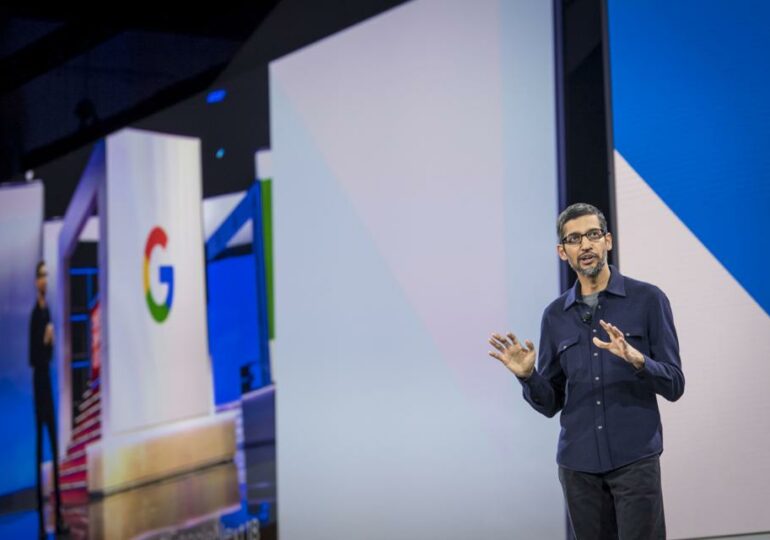It feels that we’re coming to the countdown of what companies in the U.S. are going to do about their working arrangements. Many people look to leading progressive, cutting-edge companies to see what they’re planning.
One of those leaders is Google and its parent company, Alphabet. Sundar Pichai, the CEO of both entities, previously said he’d be “flexible” with its workers and offer a “hybrid” model that will include a blend of both remote and in-office methods of working.
Pichai said, “We firmly believe that in-person, being together, having a sense of community is super important when you have to solve hard problems and create something new so we don’t see that changing. But we do think we need to create more flexibility and more hybrid models.” He feels that this approach would serve to accommodate the desires of the Googlers.
In a company blog post published Thursday, the chief executive wrote, “I believe a lasting economic recovery will come from local communities, and the people and small businesses that give them life.” Pichai added, “Google wants to be a part of that recovery. That’s why we plan to invest over $7 billion in offices and data centers across the U.S. and create at least 10,000 new full-time Google jobs in the U.S. this year. This includes investing in communities that are new to Google and expanding in others across 19 states.”
This decision strays from what was previously believed—that remote work will be the future. Google’s large investment in office space reflects that while remote work will still be an option, it won’t be universally adopted as previously believed.
“Coming together in person to collaborate and build community is core to Google’s culture, and it will be an important part of our future. So we continue to make significant investments in our offices around the country,” he said. “This will help bring more jobs and investment to diverse communities as part of our previously announced racial equity commitments. We’re already making progress: 2020 was our largest year ever for hiring Black and Latinx Googlers in the U.S., both overall and in tech roles.”
Google plans to open or enhance locations throughout the country. This includes a data center in South Carolina, a new Cloud engineering site in Durham, North Carolina and Operations Center in Southaven, Mississippi. The company will open their new Reston, Virginia office building and the first Houston office.
In the Midwest, there will be new or enhanced locations in Rochester, Minnesota, New Albany, Ohio and Papillion, Nebraska. The search giant will continue to add to its New York offices, planning to double their workforce by 2028. In other parts of the Northeast, they’ll invest in their Cambridge, Massachusetts, Pittsburgh, Pennsylvania offices and add to the workforce in Washington, D.C.
The company plans for a new Portland, Oregon office and Google will continue to grow its footprint in California. It will also support affordable housing initiatives in the Bay Area as part of its $1 billion housing commitment.
The move by Google is a smart hedge, as the company acknowledges there isn’t a one-size-fits-all solution. There are some people who can’t wait to return to an office setting. Others love being at home, as it affords them a better work and life balance.
Although it looks like we may have the upperhand on Covid-19, there is no guarantee that there won’t be future resurgences and new strains. A large number of people may remain afraid of returning to work. They’ll be worried about contracting the virus during the round-trip bus and train commutes or while at work. Potential massive legal liabilities will force management to allow people who are either at risk or overly anxious to remain at home.
Corporate executives will also factor in the risks of having a significant percentage of their staff working remotely. They’ll be anxious about the adverse impact on the company and the productivity of employees. It could divide the workforce into two camps—the ones who are in the office and those who are at home. The people working remotely may start to feel left out, as they won’t have the daily interactions and serendipitous meetings with managers and colleagues that regularly occur at the office.
Human resources could feel that recruiting, onboarding and training new remote hires will be challenging. Projects that require collaboration from multiple people may take longer without everyone being at the same location. Executives may feel that there is the potential for a loss of corporate culture and lack of camaraderie with a large majority of people working outside of the office environment. Without spontaneous meetings, lunches taken together by co-workers and drinks after work, the attachment and connection with the company diminishes.
Smart, young, talented people may elect only to work at companies that require people to be at the office. For Generation-Z and younger Millennials, it is socially important to be around other people. They desire a social life with their co-workers, need mentors and to feel a part of something. It would be disheartening for them to get a new job with a great company, only to sit in front of a computer in a small apartment or their parents’ home everyday.
It has been reported that the divorce rate has rapidly increased during the pandemic. In a study, about “31% of couples admitted lockdown has caused irreparable damage to their relationships.” Being stuck at home has caused an increase in stress and tension. This is exacerbated when parents have to juggle careers and child care for young ones.
It’s reasonable to see why Google is seriously considering a blended hybrid approach toward work. Most likely, many other companies may follow the tech giant’s lead and offer a combination of alternative work arrangements.














